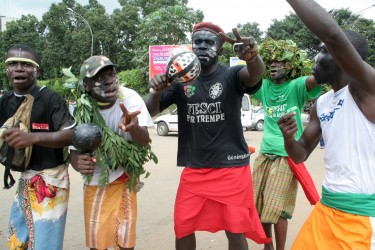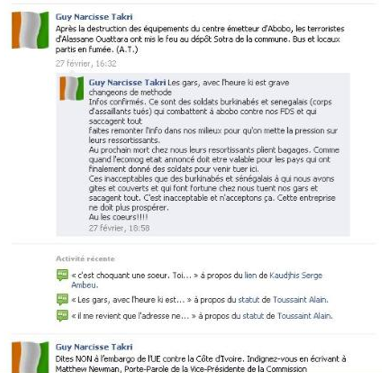This post is part of our special coverage Côte d'Ivoire Unrest 2011.
The violence surrounding a political standoff between two leaders, Laurent Gbagbo and Alassane Ouattara – who each claim to have won the presidential election in December 2010 – is rapidly worsening in Côte d’Ivoire [fr] (Ivory Coast).
While the international media appear to be have difficulty concentrating on more than one crisis with widespread political turmoil in the Middle East and Africa, the United Nations is now warning about the risk of civil war in Côte d’Ivoire.
On Thursday March 3, Ivorian security forces loyal to incumbent président Laurent Gbagbo shot dead seven women supporting elected president Alassane Ouattara during a protest, and wounded another 101 persons in the capital Abidjan.
Executions, as well as tell tales signs of division and incitements to hunt down foreigners in Ivory Coast, have been reported [fr] on different Facebook profiles and on Twitter, via the central conversation thread and hashtag #civ2010 (“Ivory Coast 2010″ – in use since the presidential election).

A demonstration of Pro-Gbagbo youth near the Golf Hotel where Alassane Ouattara sought refuge in Abidjan (25/01/2011)
Here are a couple of examples. Shortly before the attacks on mosques in Côte d'Ivoire on February 25, 2011, Aïko-Lala Méïta, daugther of Mamadou Ben Soumahoro who is a self-described “independent member of the National [Ivorian] Assembly ” [fr] and theorist of [nationalist concept of] ivoirité (PDF), wrote on her Facebook wall [fr]:
les gars, surveillez vous. surveillez vos voisins. ils ont décidé d'attaquer partout après la prière de 13 heures. avertissez qui vous pouvez. les groupes d'autodéfense, le CRAC [cercle révolutionnaire d'action concrète], ce message est pour vous. réunissez vous. on va s'amuser, aujourd'hui.
![les gars, surveillez vous. surveillez vos voisins. ils ont décidé d'attaquer partout après la prière de 13 heures. avertissez qui vous pouvez. les groupes d'autodéfense, le CRAC [cercle révolutionnaire d'action concrète], ce message est pour vous. réunissez vous. on va s'amuser, aujourd'hui. les gars, surveillez vous. surveillez vos voisins. ils ont décidé d'attaquer partout après la prière de 13 heures. avertissez qui vous pouvez. les groupes d'autodéfense, le CRAC [cercle révolutionnaire d'action concrète], ce message est pour vous. réunissez vous. on va s'amuser, aujourd'hui.](https://globalvoicesonline.org/wp-content/uploads/2011/03/Screen-shot-2011-03-04-at-4.27.11-PM.png)
Guy Narcisse Takri wrote on his Facebook wall on February 28, 2011 [fr]:
les gras, avec l'heure ki est grave changeons de methode Info confirmes. Ce sont des soldats burkinabes et senegalais (corps d'assaillants tues) qui combattent a abobo contre nos FDS et qui saccagent tout faites remonter l'info dans nos millie..ux pour qu'on mette la pression sur leurs ressortissants. Au prochains mort chez nous leurs ressortissants plient bagages. Comme quand l'ecomog etait annonce doit etre valable pour les pays qui ont finalement donne des soldats pour venir tuer ici. Ces inacceptables que des burkinabes et senegalais a qui nous avons gites et couverts et qui font fortune chez nous tuent nos gars et sacagent tout. c'est innaceptable et n'acceptons ca. Cette entreprise ne doit plus prosperer. Au les coeurs

The next day, shops belonging to Senegalese citizens Ismaël Ba, Mamadou Barroh, among others, were looted.
Some ‘Young Patriots’, a generic name given to Ivorian youth supporting president Gbagbo, as for instance the Patriotes Invisibles [fr], have lately put their Facebook profiles on private; while others, like @MossiDramane, are still very active on Twitter under various handles.
In spite of persistent tweeting urging CNN correspondent Anderson Cooper go to Côte d'Ivoire, he has still not set foot in the country. Netizens on conversation thread #CIV2010 ask: Can the international community attend to more than one crisis at once?
This post is part of our special coverage Côte d'Ivoire Unrest 2011.







1 comment